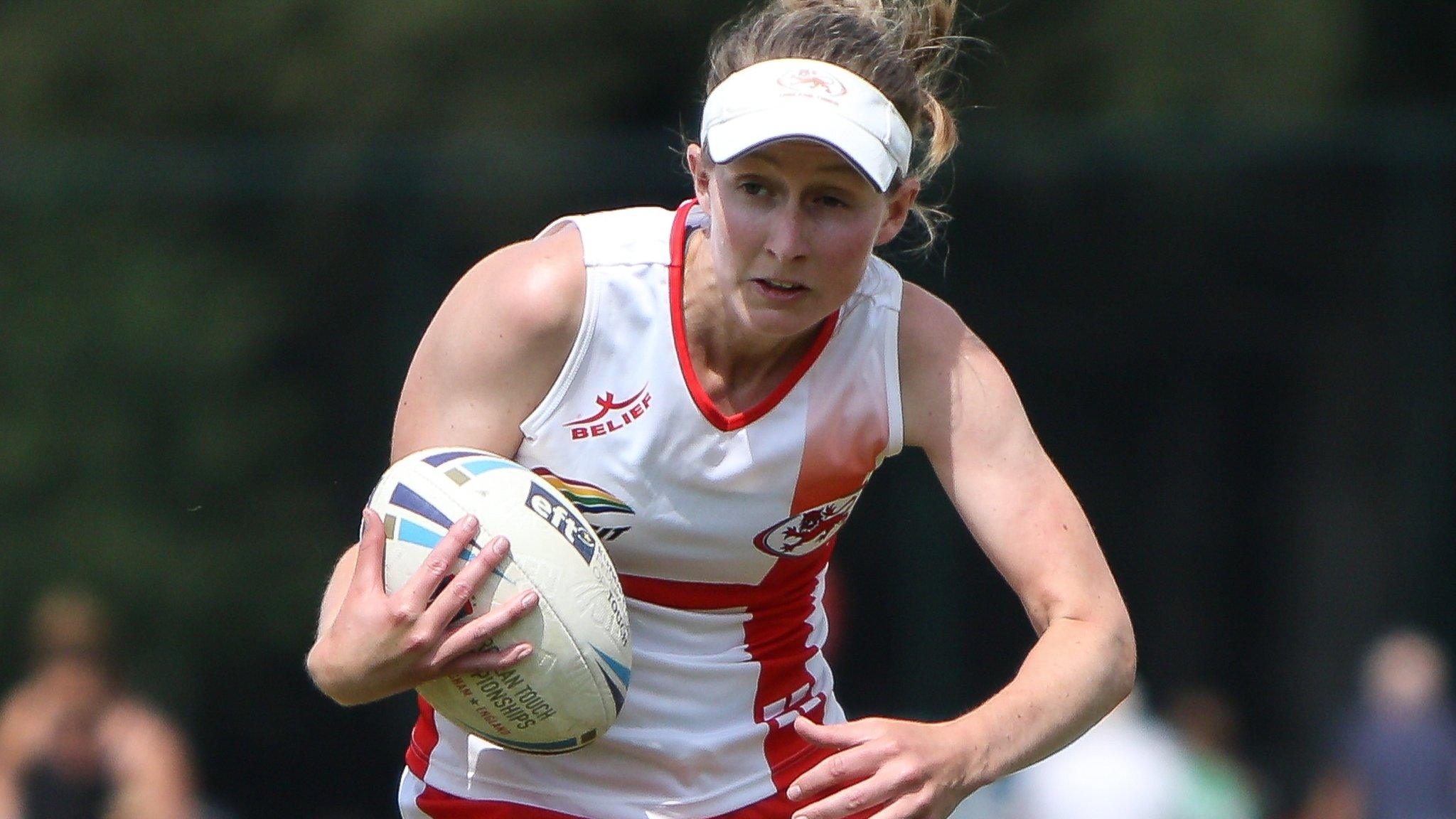Rugby League World Cup 2013: Tournament guide
- Published
The mystery of the missing trophy
The 14th Rugby League World Cup begins on 26 October with England, Scotland, Wales and Ireland aiming to end 38 years of southern hemisphere dominance.
The 14-team tournament sees 28 matches across England, Wales, Ireland and France.
England, where the bulk of the games are being played, begin proceedings when they host Australia in the double-headed opener in Cardiff on Saturday.
Steve McNamara's men are only third favourites - behind overwhelming front-runners Australia and holders New Zealand - to be crowned world champions at Old Trafford on 30 November.
Rugby League World Cup: 1972 - Superb Sullivan secures GB win
Scotland, Wales and Ireland are considered rank outsiders to become the first northern hemisphere winners since a unified Great Britain team triumphed in the 1972 edition., external
The World Cup is viewed as the latest event in the UK's 'golden decade of sport', which centred around London 2012 and also includes the Glasgow 2014 Commonwealth Games and the 2015 Rugby Union World Cup.
Domestic governing body the Rugby Football League, external hopes the tournament can capitalise on the success of last year's Olympic and Paralympic Games and boost the profile of the sport, helping it to expand beyond its traditional Yorkshire, Lancashire and Cumbrian heartlands.
"The World Cup is a wonderful opportunity to reach out to new audiences who want to be involved in the next major international sporting event after London 2012," said tournament director Nigel Wood.
"Ticket sales have been very encouraging, with strong buying patterns from people who have never previously bought tickets for rugby league events."
Here, BBC Sport tells you everything you need to know about the competition's teams, format, venues and history.
Format
POOL A | POOL B | POOL C | POOL D |
Australia | New Zealand | Scotland | Wales |
England | France | Tonga | Cook Islands |
Fiji | Papua New Guinea | Italy | USA |
Ireland | Samoa | ||
With an ever-changing format, long gaps between tournaments and on-field mismatches, the Rugby League World Cup has not been easy for supporters, new and old, to follow.
But the last edition, hosted by Australia in 2008, proved to be a resounding success, drawing large crowds and an impressive worldwide television audience.
It prompted the Rugby League International Federation, external to approve a proposal to expand from 10 to 14 teams for this year's tournament., external
Rugby League World Cup: 1954 - Britain win first competition
Pool A and Pool B are each comprised of four teams, including Australia and England in the former and New Zealand in the latter, and the top three sides from those groups will progress to the quarter-finals.
There are only three teams in each of Pool C and Pool D, which means the sides play each other and then one nation from the opposite group. Only the group winners earn a place in the last eight.
"The idea is that we don't have any of the blow-outs that you see in other World Cups," said communications manager Martin Johnson.
"So every team will go into the group stages thinking they have a chance of winning their group, although that will be a bit harder in the elite groups.
"But every team in groups C and D has a chance of winning a game and no team should go home without scoring a few tries - and that's better for the supporters and better for the development of the game."
Teams
Former England skipper Jamie Peacock, who is part of BBC Sport's commentary team for the World Cup and will have a weekly column on the website, won 48 caps for England and Great Britain before retiring from international duty in June 2012.
The Leeds Rhinos prop, 35, analyses the chances of the home nations, Australia and New Zealand.
AUSTRALIA
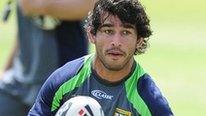
Johnathan Thurston
Coach: Tim Sheens
Captain: Cameron Smith
Star man: Johnathan Thurston (half-back)
Appearances: 13
Best: Champions (1957, 1968, 1970, 1975, 1977, 1988, 1992, 1995, 2000)
Jamie Peacock's view: "Australia are the overwhelming favourites - but they are beatable. New Zealand have proved that in big games, including the 2008 World Cup final.
"The Aussies are very effective at international level and it is a big help that their four key players - Johnathan Thurston, Cooper Cronk, Cameron Smith and Billy Slater - play together for Queensland in the State of Origin. That's another high-pressure situation.
"Australia have the biggest pool of players to pick from so it is no surprise they are the favourites."
ENGLAND
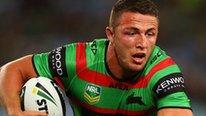
Sam Burgess
Coach: Steve McNamara
Captain: Kevin Sinfield
Star man: Sam Burgess (prop forward)
Appearances: Four (plus nine as Great Britain)
Best: Runner-up (1975, 1995)
*Great Britain were three-time champions (1954, 1960, 1972)
Peacock's view: "They have a great chance of winning the tournament, especially with home advantage. That's a big bonus. Look at the Olympics - some of the performances from the British athletes rose to levels they didn't know they could reach.
"All the main players are fully fit and Steve McNamara has managed to break down the barriers of the club rivalries which exist between the players on a weekly basis in the Super League. This is something that others haven't been able to do in the past.
"And they have got Sam Burgess, who is the best forward in the world. That's because he can play prop, second row or loose forward as well as anyone else in the world."
NEW ZEALAND
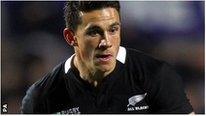
Sonny Bill Williams
Coach: Stephen Kearney
Captain: Simon Mannering
Star man: Sonny Bill Williams (second row)
Appearances: 13
Best: Champions (2008)
Peacock's view: "Defending champions New Zealand have got every chance of upsetting the odds again and repeating their 2008 success.
"They have a lot of players who not only start regularly in the NRL, but are key players for their sides.
"The Kiwis have lost their last five Tests against the Aussies but have managed to beat them in the big games like the 2008 World Cup and Four Nations.
"Sonny Bill Williams being available is huge for New Zealand and the tournament. He's just helped Sydney Roosters win the NRL and he lit up the competition.
"Everyone wants to see the star players at the World Cup and Sonny Bill is a name that transcends sports because of his spells in rugby union and boxing."
SCOTLAND
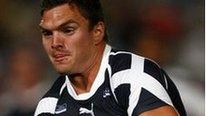
Danny Brough
Coach: Steve McCormack
Captain: Danny Brough
Star man: Danny Brough (half-back)
Appearances: Two (plus nine as Great Britain)
Best: One win (2008)
Peacock's view: "Undoubtedly, the Super League's 2013 Man of Steel Danny Brough is going to the main man for Scotland. He will dictate everything they do - it will all run through him.
"The other players will look up to Brough. He is the Huddersfield captain and showed his leadership skills as they won the Super League Leaders' Shield. He will have to do that - and more - for Scotland."
WALES
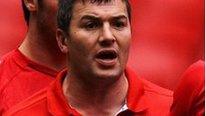
Iestyn Harris
Coach: Iestyn Harris
Captain: Craig Kopczak
Star men: Ben Flower (prop) and Craig Kopczak (prop)
Appearances: Three (plus nine as Great Britain)
Best: Semi-finalists (1995, 2000)
Peacock's view: "Wales are growing as a force every year under Iestyn Harris. He has got a good squad together, with plenty of young players.
"For them, this World Cup is all about gaining experience as a team. They are not going to win it but they can have a great time and possibly cause an upset.
"They have got two very good props in Ben Flowers and Craig Kopczak, who would both be picked in a combined Great Britain squad if there was one."
IRELAND
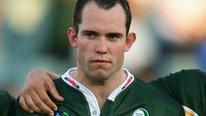
Pat Richards
Coach: Mark Aston
Captain: Liam Finn
Star man: Pat Richards (wing)
Appearances: Two
Best: Quarter-finalists (2000, 2008)
Peacock's view: "Ireland are in the same group as England and Australia and I doubt they are capable of upsetting those two. But they will be hoping to give them a close game.
"It is clear that the other teams in the group, including Fiji, are much stronger, but Ireland will look at this World Cup as an opportunity to give rugby league a huge lift in their country.
"Pat Richards is a massive player for them. He has been one of the top three overseas players the Super League has ever had. He's a magnificent player, a great goalkicker and also a wonderful leader."
Venues
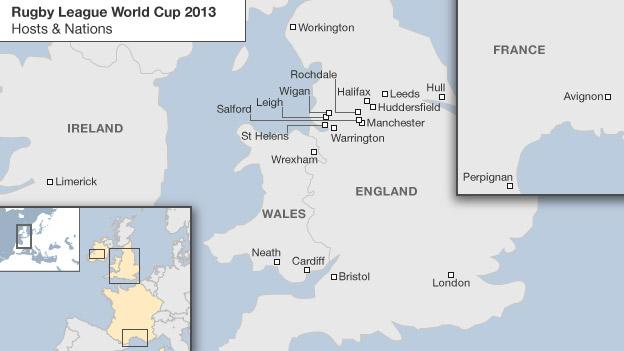
There are two stadiums in Hull - the KC Stadium and Craven Park - and 21 in total
Although the tournament is split across four nations, England is the primary host with 20 of the 28 matches taking place across the country.
Games are being played in 20 host towns and cities and include London, Cardiff, Limerick and Avignon alongside several venues in the traditional Yorkshire and Lancashire heartlands of the sport.
Why the French banned rugby league
Wembley Stadium hosts both semi-finals in a special double-header, while the final will be staged at Old Trafford in Manchester.
Hull is the only place to hold matches at two different venues - the KC Stadium and Craven Park.
But the tournament begins in Wales, where England meet Australia at Cardiff's Millennium Stadium on 26 October.
As well as the opening fixture, Wales also stages matches at the Racecourse Ground in Wrexham and Neath's The Gnoll.
France play two of their group matches on home soil in Avignon and Perpignan, while Ireland meet Australia in Limerick.
"If you look at the 2000 World Cup [which was staged across the UK, Ireland and France] it was a struggle. We went to a lot of football grounds and that wasn't very successful," added Johnson.
Rochdale Fijians excited about World Cup
"So we've looked at it very closely this time and we think we've got the blend just right. The big games are in big places: the Millennium Stadium, Wembley, Old Trafford. Old Trafford does a great job for us with the Super League Grand Final being held there every year, so that was a no-brainer.
"A double-header at Wembley will be fantastic, and we had to have a marquee venue for the opener and you can't do better than Cardiff. After that we go to the heartlands, areas where we know our fans will come out.
"But we're also going to areas where the game is developing, places like Bristol, Limerick and the two games in France. So it's a really good spread for everybody."
History
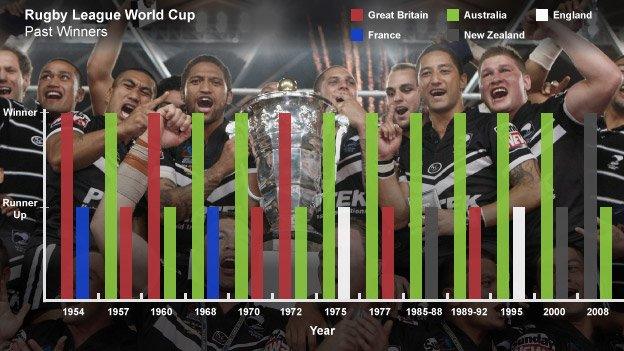
Australia have dominated the competition since its inception in 1954, winning nine of the 13 tournaments, and begin as overwhelming favourites to regain the title this year.
France were the driving force behind the World Cup's creation and hosted the inaugural four-team event, which also included Australia, New Zealand and Great Britain. But they were defeated in the final by Great Britain in front of an expectant Parisian crowd.
The next five World Cups, which took place in 1957, 1960, 1968, 1970 and 1972, featured the same four nations. Australia and Great Britain dominated - winning three times and twice respectively - within varied formats.
The original trophy, which will be the one presented to the tournament winners, was stolen during the 1970 competition while on public display at Bradford's Midland Hotel and was not found again until 1990.
The competition was revamped in 1975, becoming a five-team tournament with Great Britain splitting into England and Wales and the action being played over eight months as part of a "World Series".
It returned to the previous format in 1977 as Australia defended their crown, before another overhaul - including the addition of Papua New Guinea - saw matches stretched over three years between 1985-1988 and 1989-1992.
The unstoppable Kangaroos won both, including a 10-6 victory over Great Britain in front of a World Cup record crowd of 73,361 at Wembley in 1992.
In 1995, to mark the centenary of rugby league's birth, an innovative new structure was adopted. The number of teams doubled to 10, with Fiji, Tonga, Samoa and South Africa participating for the first time.
Australia's continued their dominance and also added the 16-nation version in 2000, when Lebanon, Russia, Ireland, Scotland and the Cook Islands made their bows.
But the Kangaroos were denied a seventh straight title when Antipodean rivals New Zealand upset the odds in 2008. The Kiwis lifted the trophy for the first time after an epic final against Australia, external in Brisbane.
- Published21 October 2013
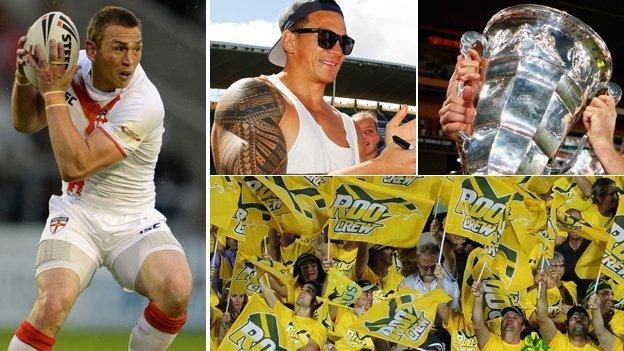
- Published1 November 2015
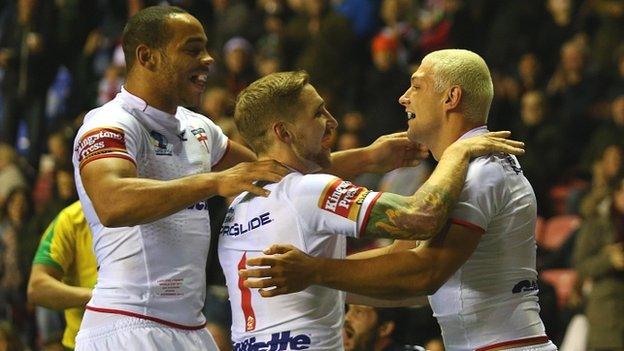
- Published19 October 2013
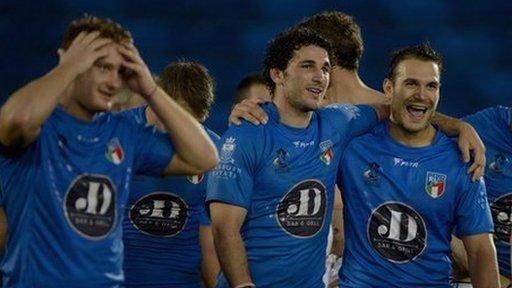
- Published24 October 2013
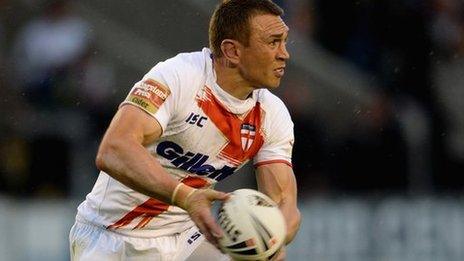
- Published30 November 2013
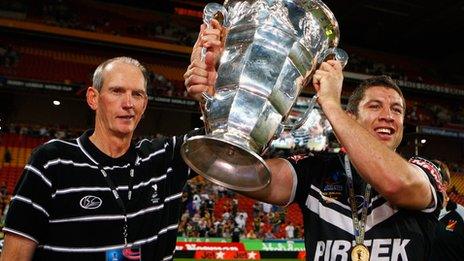
- Published21 May 2019
